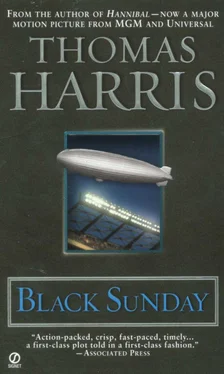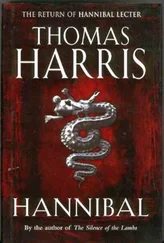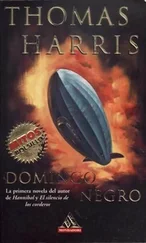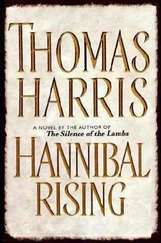None of his ends would be served by getting himself killed in New Orleans. Originally, he had not intended to take part in the action, any more than he had at Munich. He was not afraid to do it, but he was fixed on the thought of what he might become if he lived. If the trouble on the Leticia had not occurred, he would still be in Lebanon.
Fasil could see that the odds of his getting away clean from New Orleans were not good under the current plan. His job was to provide muscle and covering fire at New Orleans Lakefront Airport while the bomb was being attached to the blimp. It was not possible to clamp the nacelle to the blimp at some other location—the ground crew and the mooring mast were necessary because the airship must be held rock-steady while the work was going on.
Lander might be able to fool the ground crew for a few vital seconds by claiming the nacelle contained some esoteric piece of television equipment but the ruse would not last long. There would be violence, and after the takeoff Fasil would be left in the open on the airfield, possibly in a converging ring of police. Fasil did not think his role worthy of his abilities. Ali Hassan would have performed this function if he had not been killed on the freighter. It was certainly not a job that would justify the loss of Muhammad Fasil.
If he was not trapped at the takeoff site, the best chance of escape was an air hijack to a friendly country. But at Lakefront Airport, a private facility on the shore of Lake Pontchartrain, there were no long-range passenger flights. He might take over a private aircraft with range enough to reach Cuba, but that would not do. Cuba could not be depended upon to shield him. Fidel Castro was tough on hijackers, and in the face of an enraged America he might hand Fasil over. Besides, he would not have the advantage of a planeload of hostages, and no private plane would be fast enough to escape the American fighters screaming into the sky from a half dozen coastal bases.
No, he had no desire to fall into the Gulf of Mexico in some smoke-filled cockpit, knowing it was all over as the water rushed up to smash him. That would be stupid. Fasil was fanatic enough to die gladly if it were necessary to his satisfactions, but he was not willing to die stupidly.
Even if he could slip across the city to New Orleans International, there were no commercial flights with range enough to reach Libya without refueling, and the probabilities of making a successful refueling stop were low.
The House of War would be enraged as it had not been since Pearl Harbor. Fasil recalled the words of the Japanese admiral after the strike at Pearl: “I fear we have awakened a sleeping giant and filled him with a terrible resolve.”
They would take him when he stopped to refuel—if he ever got off the ground. Very likely air traffic would be frozen within minutes of the blast.
It was clear to Fasil that his place was in Beirut, leading the new army of front-fighters who would flock to him after this triumph. It would be a disservice to the cause for him to die in New Orleans.
Now Lander clearly had the qualifications to carry out the technical end. Having seen him, Fasil was confident that he was willing to do it. Dahlia appeared to have control of him. There simply remained the problem of last-minute muscle at the airport. If Fasil could arrange for that, then there was no need for his actual presence. He could be waiting in Beirut with a microphone in his hand. A satellite link to New York would have his picture and his statement on worldwide television in minutes. He could hold a news conference. He would be in a stroke the most formidable Arab in the world.
All that would be required at the New Orleans airport was a couple of skilled gunmen, imported at the last minute, under Dahlia’s command and ignorant of their mission until just before they went into action. That could be accomplished. Fasil had made up his mind. He would see the nacelle through the final stages of its construction, would see that it got to New Orleans. Then he would leave.
To Fasil, Lander’s progress with the huge bomb was maddeningly slow. Lander had asked for the maximum amount of explosives the blimp could carry, with shrapnel, under ideal conditions. He had not really expected to get as much as he asked for. Now that it was here he intended to take full advantage of it. The problem was weight and weather—the weather on January 12 in New Orleans. The blimp could fly in any conditions in which football could be played, but rain meant extra weight and New Orleans had received seventy-seven inches of rain in the past year, far more than the national average. Even a dew covering the blimp’s great skin weighed seven hundred pounds, detracting that much from its lifting power. Lander had calculated the lift very carefully, and he would be straining the blimp to the utmost when it rose into the sky carrying its deadly egg. On a dear day, with sunshine, he could count on some help from the “superheat” effect, added lift gained when the helium inside the bag was hotter than the outside air. But unless he was prepared, rain could ruin everything. By the time he was ready to take off, some of the ground crew would almost certainly have been shot and there could be no delay in getting airborne. The blimp must fly, and fly immediately. To allow for the possibility of rain, he had split the nacelle, so that part of it could be left behind in bad weather. It was a pity that Aldrich did not use a surplus Navy dirigible instead of the smaller blimp, Lander reflected. He had flown Navy airships when they carried six tons of ice, great sheets of it, that slid down the sides and fell away in a glittering, crashing cascade when the dirigible reached warmer air. But those long-extinct ships had been eight times the size of the Aldrich blimp.
Balance must be close to perfect with either the entire nacelle or three-quarters of it. That meant having optional mounting points on the frame. These changes had taken time, but not so much time as Lander had feared. He had a little over a month before the Super Bowl. Of that month he would lose most of the last two weeks flying football games. That left him about seventeen working days. There was time for one more refinement.
He set up on his workbench a thick sheet of fiberglass five inches by seven and one-half inches in size. The sheet was reinforced with metal mesh and curved in two planes, like a section of watermelon rind. He warmed a piece of plastic explosive and rolled it into a slab of the same size, carefully increasing the thickness of the plastic from the center toward the ends.
Lander attached the slab of plastic to the convex side of the fiberglass sheet. The device now looked like a warped book with a cover on only one side. Smoothed over the plastic explosive were three layers of rubber sheeting cut from a sick-room mattress cover. On top of these went a piece of light canvas bristling with .177 caliber rifle darts. The darts sat on their flat bottoms, glued to the canvas closer together than the nails in a fakir’s bed. As the dart-studded canvas was pulled tight around the convex surface of the device, the sharp tips of the darts diverged slightly. This divergence was the purpose of curving the device. It was necessary if the darts were to spread out in flight in a predetermined pattern. Lander had marked out the ballistics with great care. The shape of the darts should stabilize them in flight just like the steel flechettes used in Vietnam.
Now he attached three more layers of dart-covered canvas. In all, the four layers contained 944 darts. At a range of sixty yards, Lander calculated, they would riddle an area of one thousand square feet, one dart striking in each 1.07 square feet with the velocity of a high-powered rifle bullet. Nothing could live in that strike zone. And this was only the small test model. The real one, the one that would hang beneath the blimp, was 317 times bigger in surface area and weight and carried an average of 3.5 darts for every one of the 80,985 persons Tulane Stadium could seat.
Читать дальше












